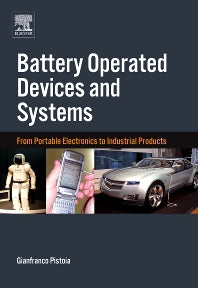Freshly Printed - allow 10 days lead
Couldn't load pickup availability
Battery Operated Devices and Systems
From Portable Electronics to Industrial Products
Gianfranco Pistoia (Author)
9780444532145, Elsevier Science
Hardback, published 24 October 2008
408 pages
24 x 16.5 x 2.7 cm, 0.88 kg
"The book is enriched with numerous figures and…They are always very instructive…The book is a must for every library associated with research and development groups working on electrochemical energy conversion and storage." --J Solid State Electrochem, 2012 "[This book] by an expert known for his numerous contributions in the fields of intrinsically conducting polymersand materials for secondary lithium batteries provides exactly this help. [T]he first pages are… enlightening: The reviewer cannot remember having seen before such well-organized lists of possible/already established applications in alphabetic and in topological order. Quite obviously the author is drawing from a rich source of own scientific work…. The book is a must for every library associated with research and development groups working on electrochemical energy conversion and storage." --Rudolf Holze in the Journal of Solid State Electrochemistry
Battery Operated Devices and Systems provides a comprehensive review of the essentials of batteries and battery applications as well as state-of-the-art technological developments. The book covers the most recent trends, especially for the ubiquitous lithium ion batteries. It lays particular emphasis on the power consumption of battery operated devices and systems and the implications for battery life and runtime. Battery management is also dealt with in detail, particularly as far as the charging methods are concerned, along with the criteria of battery choice. This book describes a variety of portable and industrial applications and the basic characteristics of all primary and secondary batteries used in these applications. Portable applications include mobile phones, notebook computers, cameras, camcorders, personal digital assistants, medical instruments, power tools, and portable GPS. Industrial applications range from aerospace and telecommunications to emergency systems, load levelling, energy storage, toll collection, different meters, data loggers, oil drilling, oceanography, and meteorology. The book also discusses wireless connectivity, i.e. Wi-Fi, Bluetooth and Zigbee, and concludes with some market considerations. Links to further reading are provided through the 275 references. This book will be a valuable information source for researchers interested in devices and systems drawing power from batteries. It will also appeal to graduates working in research institutions; universities and industries dealing with power sources and energy conversion; civil, electrical and transport engineers; and chemists.
1. Areas of Battery Applications2. Basics of Batteries3. Portable Applications4. Industrial Applications (Except Cars)5. Car Applications: Traction and Control Systems
Subject Areas: Electronic devices & materials [TJFD], Electronics & communications engineering [TJ], Energy conversion & storage [THRH], Electrical engineering [THR], Materials science [TGM], Chemical engineering [TDCB], Industrial chemistry [TDC], Biochemical engineering [TC], Electrochemistry & magnetochemistry [PNRH]


